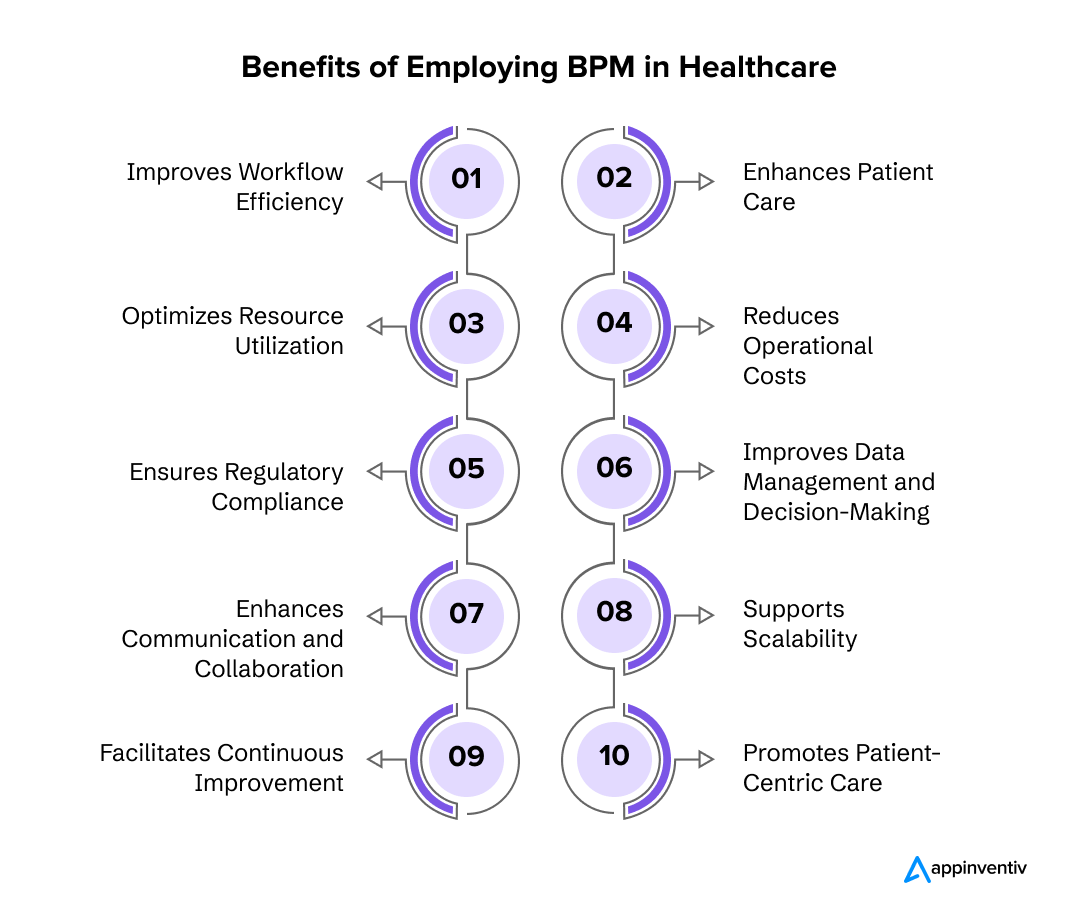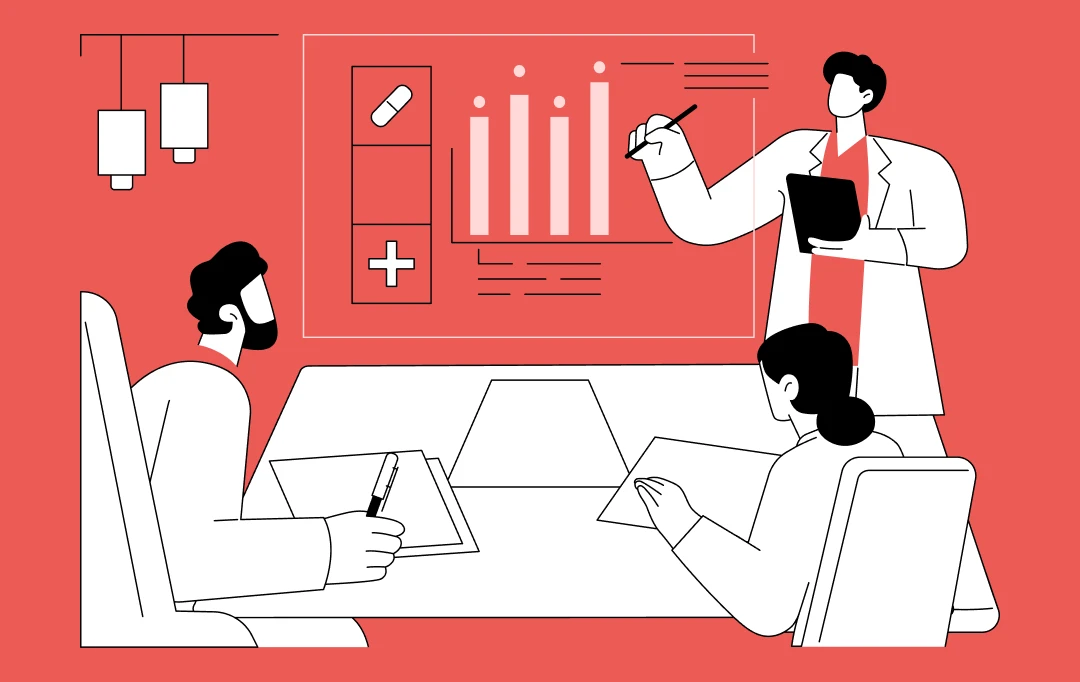- Defining BPM for Healthcare Organizations
- Types of BPM in Healthcare
- Why is BPM Critical for Healthcare Operations
- BPM in Healthcare Use Cases and Examples
- Key Features of BPM in Healthcare
- Overview of Healthcare BPM Platform Development
- Overcoming Barriers to BPM Implementation
- The Emerging Trends of BPM in Healthcare
- Appinventiv - Helping You Achieve Operational Excellence through BPM
- FAQs
Imagine you are the head of a rapidly growing hospital. Your staff is stretched thin, patient admissions are increasing by the day, and processes seem to be unraveling at the seams. To make matters worse, the billing department is overwhelmed with claims, patient wait times are growing, and complaints about miscommunication between departments are pouring in. Worse still, you find that regulatory compliance is slipping through the cracks, and costly penalties loom on the horizon.
Without a system to streamline operations, these common issues can compound and disrupt your hospital’s efficiency. This is where Business Process Management (BPM) steps in. But what is BPM in healthcare?
Well, BPM in healthcare provides a framework that automates and optimizes every facet of healthcare operations, from patient care to administrative workflows. By integrating business process management in healthcare, organizations can prevent these challenges before they spiral out of control, enabling smoother, more efficient processes and ultimately delivering better patient outcomes.
Through this article, we will be exploring multiple facets of healthcare BPM – what it is, its types, role in changing healthcare operations, and developmental considerations.
Defining BPM for Healthcare Organizations
Business Process Management is the discipline of managing, optimizing, and automating business processes to achieve organizational efficiency. In the context of healthcare, BPM is used to automate clinical, operational, and administrative workflows to improve efficiency, reduce errors, and ensure compliance with regulations.
Whether it’s streamlining patient admissions, optimizing resource allocation, or enhancing billing accuracy, BPM software for healthcare helps hospitals ensure that every function runs like clockwork.
Types of BPM in Healthcare
1. Human-Centric BPM: This type prioritizes tasks that require human intervention. In healthcare, human-centric BPM can handle processes like patient check-ins, physician orders, or lab tests that need staff involvement.
2. Integration-Centric BPM: Here, the focus is on integrating multiple software systems, such as Electronic Medical Records or billing systems, to ensure seamless data exchange between them.
3. Document-Centric BPM: Document-centric BPM focuses on processes involving heavy documentation, such as insurance claims, patient records, and compliance reporting. Its primary purpose is to ensure that the documents are managed efficiently, reducing errors and improving speed.
Now that we have looked into the basics and types of BPM in healthcare, let us get down to the serious bit – the role of BPM in shaping healthcare’s future.
Why is BPM Critical for Healthcare Operations
Healthcare organizations operate in an environment that demands precision, agility, and compliance. For such high-precision environment, BPM provides solutions that tackle inefficiencies head-on, transforming healthcare processes at every level:

Improves Workflow Efficiency: BPM services for healthcare standardizes and automates processes across departments, reducing bottlenecks and ensuring smooth transitions between tasks, such as patient admissions and discharges.
Enhances Patient Care: By reducing manual, error-prone tasks, BPM software implementation in healthcare ensures that clinical staff spend less time on administrative work and more time caring for patients. This leads to timely care delivery and improved patient outcomes.
Optimizes Resource Utilization: BPM ensures optimal use of resources such as staff, equipment, and rooms by automating scheduling and inventory management. Hospitals can reduce downtime and avoid over or under-utilization of critical assets.
Reduces Operational Costs: BPM eliminates unnecessary steps in workflows, cutting down on administrative costs and reducing errors that could lead to financial losses, such as incorrect billing.
Ensures Regulatory Compliance: Healthcare has to follow a series of strict regulatory oversight. BPM solution application in healthcare ensures that processes are documented and compliant with standards like HIPAA, making audits easier and reducing the risk of penalties.
Improves Data Management and Decision-Making: By integrating data from various hospital systems (e.g., Electronic Health Records, financial systems), BPM provides real-time insights that improve clinical and administrative decision-making.
Enhances Communication and Collaboration: BPM fosters better coordination among departments, ensuring that all stakeholders: clinicians, administrators, and support staff, have access to the information they need, when they need it.
Supports Scalability: As hospitals and other healthcare organizations grow or merge with other facilities, BPM can scale to accommodate new services, locations, and complexities, without disrupting operations.
Facilitates Continuous Improvement: One of the other major benefits of BPM in healthcare lies in the software monitoring and measuring performance metrics, allowing hospitals to continuously refine processes and improve efficiency over time.
Promotes Patient-Centric Care: By streamlining processes such as appointment scheduling, treatment plans, and follow-up care, implementing business process management in healthcare ensures a smoother, more patient-focused experience.
The role of healthcare business process management is pivotal for addressing the sector’s complex operational challenges. By optimizing workflows, BPM ensures that healthcare providers can deliver more efficient, error-free patient care while reducing operational costs. From streamlining administrative tasks to enhancing patient data management, the solution helps healthcare organizations stay agile and compliant in a rapidly evolving landscape.
BPM in Healthcare Use Cases and Examples
To understand these benefits better, it’d help to know the use cases and applications of BPM in healthcare. Let us look into some of the top examples or applications.

Claims Processing
Processing claims is often time-consuming and complex, involving multiple steps that require precise coordination between different teams. BPM solutions streamline this workflow by automating key tasks, such as claim submission, approvals, and appeals.
This not only speeds up the process but ensures that claims are monitored at every stage, reducing delays and improving transparency. With a BPM system, healthcare organizations can prioritize claims efficiently and ensure timely reimbursements, leading to better cash flow and operational efficiency.
Managing Big Data
With the explosion of healthcare data from sources like electronic health records, the need for effective data management is more critical than ever.
BPM technology enables organizations to harness big data for better decision-making, whether it’s tracking disease trends or predicting the impact of treatment plans. For instance, analyzing regional health data can offer insights into vaccine efficacy or forecast future healthcare needs. This data-driven approach improves both preventive care and the ability to respond proactively to emerging health concerns, benefiting individual patients and entire populations.
Bridging Gaps Between Software Systems
In many healthcare settings, multiple software applications are used to manage everything from patient records to billing. BPM helps bridge the gaps between these systems, ensuring that critical data flows smoothly and is accessible when needed.
By automating manual processes, like patient check-ins, email communications, or face-to-face interactions, it not only reduces administrative burden but also enhances compliance and speeds up care delivery. This leads to more efficient patient management and reduced operational risks.
Improving Consistency in Healthcare
Consistency is often a challenge in healthcare due to variations in procedures, staffing, and system inefficiencies. BPM solutions bring greater consistency to healthcare operations by standardizing workflows and ensuring that information flows seamlessly between departments.
For example, reducing waste in processes can lead to significant cost savings, as indicated by a JAMA Network report that estimates potential savings of up to $286 billion annually. Implementing BPM allows healthcare organizations to minimize these inefficiencies, ensuring better patient care, increased compliance, and reduced operational waste.
Optimizing Billing and Claims
Healthcare billing involves coordination across various departments, from doctors and nurses to the pharmacy and insurance providers. By automating and streamlining these workflows, BPM software improves the accuracy and speed of billing processes.
It also provides audit trails, making it easier to track payments, reimbursements, and claims. The result is fewer billing errors, faster claim resolutions, and enhanced revenue cycle management.
Ensuring Compliance
Compliance in healthcare is non-negotiable, and keeping up with regulatory standards can be overwhelming. BPM systems simplify this by ensuring that all necessary records, reports, and process data are well-maintained and easily accessible during audits.
This not only assures compliance with regulations but also helps maintain a high standard of patient care by keeping processes transparent and accountable.
Streamlining Leave Management
With large teams of healthcare professionals to manage, tracking leave requests and ensuring appropriate staffing can be a challenge. BPM software automates the process of managing leave requisitions, attendance tracking, and shift scheduling.
This helps avoid delays in approvals, ensures adequate staffing, and optimizes the use of human resources, which is particularly crucial for maintaining patient care quality.
Managing Document Workflows
Every healthcare organization deals with a massive amount of documentation, from patient records and internal reports to compliance-related files. BPM solutions help digitize, organize, and manage these documents efficiently.
With centralized cloud-based storage, it becomes easier to access, track, and cross-reference information. Moreover, BPM provides secure access controls for sensitive data, helping reduce the risk of data breaches while also ensuring that important documents are always up-to-date and well-organized.
Automating Procurement Processes
Healthcare facilities need a consistent supply of medical equipment and materials to function effectively.
BPM systems automate procurement processes, ensuring timely approvals, tracking supplier performance, and monitoring inventory levels. This minimizes the risk of stock shortages and ensures that medical supplies are always available when needed, ultimately improving the quality of care.
Also Read: The Role of Technology in Healthcare Supply Chain Management
Patient Scheduling Efficiency
Effective patient scheduling can greatly impact both the quality of care and the organization’s operational efficiency.
BPM solutions automate and optimize patient scheduling, from appointment booking to follow-up reminders, making it easier for staff to manage the patient load. This not only improves the overall patient experience but also maximizes physician utilization and clinic revenue.
Enhancing Clinical Processes
Care coordination among different departments and specialists is often complicated, but BPM can simplify these workflows. By integrating electronic health record management, treatment planning, and results notifications, BPM ensures that clinical processes are more organized and efficient.
Admission and discharge processes, for example, can be handled with fewer delays, ensuring a smoother patient experience. BPM also allows healthcare providers to monitor treatment plans in real-time, which supports better clinical decision-making.
Streamlining Administrative Workflows
From tracking departmental productivity to managing supply orders, administrative tasks in healthcare can often become overwhelming. BPM solutions automate these tasks, ensuring that all departments are aligned and functioning efficiently. Whether it’s managing the patient journey from appointment to follow-up or coordinating supplies and medication orders, BPM streamlines operations and allows staff to focus on more critical, patient-centered tasks.
Automating Financial Processes
Tracking employee expenses, bonuses, salary payments, and taxes is critical for healthcare organizations. BPM systems automate these financial processes, ensuring that they are executed with precision.
Additionally, BPM enables accurate tracking of payments to suppliers and helps compile necessary tax documentation, reducing the risk of financial discrepancies and ensuring smooth, compliant financial operations.
With the impact now clear, let’s dive into the core features that make BPM solution application in healthcare possible. Each feature does not just align with healthcare’s demands but also empowers organizations to enhance their operational excellence.
Key Features of BPM in Healthcare
When building a BPM solution, it’s essential to focus on features that meet the complex needs of healthcare organizations. Although every BPM use case in healthcare is different, in our experience at Appinventiv, there are some common features that we have integrated in almost every BPM solution we have built. Some of those most impactful features include:

End-to-End Workflow Automation: A BPM system should be able to automate a wide range of tasks, from patient registration to discharge, and everything in between. This feature holds an importance in improving operational efficiency and reduces human errors.
Also Read: Why Should Businesses Care about Healthcare Automation?
Data Integration and Interoperability: Seamless integration with existing systems, such as Electronic Health Records, financial management systems, and other health IT platforms, is critical for a unified approach to hospital management, something which becomes possible by integrating BPM software in healthcare.
Performance Analytics and Reporting: Advanced healthcare BPM solutions provide real-time monitoring and analytics, allowing healthcare managers to track key performance indicators, identify bottlenecks, and make data-driven decisions. This feature helps ensure that healthcare organizations are constantly refining their operations for optimal efficiency.
Dynamic Workflow Adjustments: Healthcare environments are ever-changing and to be aligned with them, BPM systems should also offer the flexibility to adjust workflows dynamically in response to new regulations, patient volumes, or technological advances.
Task Prioritization and Alerts: BPM systems can prioritize tasks based on urgency or patient condition, ensuring that high-priority cases are addressed immediately. To ensure that the healthcare staff stay on top of time-sensitive activities the system should be designed to send automated alerts.
Mobile Accessibility: Modern BPM for healthcare systems offer mobile access to clinical and operational data, allowing medical staff to monitor processes and access patient information on the go, leading to faster decision-making and better care delivery.
Role-Based Access Control (RBAC): One of the core features of BPM in healthcare, RBAC ensures that only authorized personnel can access sensitive patient data, providing an extra layer of security and ensuring compliance with privacy regulations.
Artificial Intelligence and Predictive Analytics: BPM systems can also be integrated with artificial intelligence to analyze historical data, predict future trends, and make real-time recommendations, improving decision-making and resource management.
Compliance Management: Healthcare business process management often comes with built-in compliance tools, ensuring that healthcare organizations meet HIPAA, GDPR, and other regulatory standards without needing manual intervention.
Now that we have looked into some of the most critical features of BPM for healthcare, it’s time to take the conversation up a notch by talking about the core aspects of BPM – Development process and cost considerations.
Overview of Healthcare BPM Platform Development
Developing a custom BPM solution for healthcare involves multiple phases, from planning and design to testing and deployment. Here’s a brief look at the typical development process we follow when we work on healthcare BPM platforms development:
1. Needs Assessment: Understanding the unique workflow challenges of the healthcare organization.
2. Process Design: Mapping out current workflows and designing optimized processes.
3. Development and Integration: Building the BPM solution while ensuring it integrates with existing systems like EMRs, billing software, and other healthcare platforms.
4. Testing and Optimization: Ensuring the system works effectively in a live hospital environment, followed by continuous optimization based on user feedback.
5. Deployment and Training: Implementing the solution across the hospital and providing training to ensure staff can maximize its benefits.
To build a solution like this, the typical range of healthcare BPM software development cost that you can expect would vary depending on factors like the size of the organization, the complexity of workflows, and the number of integrations required. On average, healthcare BPM software can range from $40,000 to $400,000 for a custom solution.
While healthcare organizations also have the option to invest in third-party, off-the-shelf solutions, they come with their own fair share of challenges specific to scalability and customization.
Compared to this, when we work on healthcare BPM platforms development from the scratch level, the roadblocks remain limited. In our decade long expertise of being a healthcare software development company, we have faced very low-complex level challenges of BPM implementation in healthcare. Here’s a high-level view of them.
Overcoming Barriers to BPM Implementation
We understand that implementing business process management in healthcare does not come without challenges, but with the right approach, we are able to address these barriers extremely effectively:

Resistance to Change: Staff may be resistant to adopting new technologies, particularly if they are used to legacy systems.
Solution: Involve end-users early in the process, offering extensive training and support to ensure a smooth transition.
Integration with Legacy Systems: Many healthcare providers still rely on outdated technologies, making integration difficult.
Solution: Opt for a phased BPM implementation approach, starting with non-critical processes to ensure minimal disruption.
Check out this guide to modernizing legacy systems in healthcare
Initial Costs and Investment: While the long-term ROI of BPM is fairly clear, the upfront investment can be daunting.
Solution: Present a detailed cost-benefit analysis to stakeholders, highlighting the long-term savings, improved efficiency, and potential revenue increases from BPM adoption.
Data Security Concerns: Healthcare organizations are responsible for safeguarding patient data, and BPM systems must comply with strict regulations like HIPAA.
Solution: Choose BPM solutions with built-in encryption, access controls, and compliance certifications to mitigate risks.
Cultural and Process Disruption: Hospitals often operate under deeply ingrained processes, making it difficult to shift to new ways of working.
Solution: Leadership should advocate for BPM by communicating its value and showcasing early wins through pilot projects.
Customization Needs: Every healthcare organization has unique needs that might not be addressed by an out-of-the-box BPM solution.
Solution: Build a flexible BPM system that allows for customization to adapt to the specific processes and workflows of your organization.
While on one side of the successful integration of business process management in healthcare lies carefully strategized features set, on the other side there is the knowledge set that comes associated with knowing how the healthcare business process management is moving.
The Emerging Trends of BPM in Healthcare
The role of BPM in healthcare is evolving, driven by advancements in technology and changing patient expectations. Here are some key trends shaping the future of BPM in healthcare:

AI and Machine Learning Integration: Future-centric BPM software for healthcare can be presumed to increasingly incorporate AI to optimize workflows in real time. The technology can be used to analyze large data sets to identify patterns and recommend improvements. For example, to predict patient admission surges, allowing hospitals to prepare resources in advance.
Predictive Analytics for Proactive Care: Leveraging predictive analytics, BPM services for healthcare can forecast patient demand and optimize staffing, bed availability, and equipment needs. Predictive models could also anticipate potential bottlenecks in care delivery, allowing hospitals to address issues before they impact patients.
Blockchain for Enhanced Security: With the growing importance of data security, blockchain technology will likely be integrated into business process management in healthcare systems to ensure immutable, secure records of all healthcare transactions, from patient data to supply chain management.
Cloud-Based BPM for Agility: As healthcare organizations shift to cloud-based infrastructures, BPM systems will also evolve to be more agile, providing hospitals with greater flexibility, reduced maintenance costs, and faster access to software updates and innovations.
Patient-Centered Workflows: BPM will become more focused on patient experience, personalizing workflows based on individual patient needs and preferences. This will help hospitals deliver more tailored, effective care while reducing patient churn and improving outcomes.
Telehealth and Remote Monitoring Integration: BPM for healthcare will play a crucial role in coordinating telehealth services, ensuring seamless workflows between in-person and remote care, thus expanding the reach of healthcare services to more patients.
Although we have talked in bits and pieces of our role in BPM software implementation in healthcare and shaping your brand as the industry’s future, let us give you a picture of what to expect when you partner with us for integrating BPM software in healthcare.
Appinventiv – Helping You Achieve Operational Excellence through BPM
For healthcare organizations, the journey to operational excellence begins with an in-depth understanding of how well-designed processes drive success. Business Process Management is the cornerstone of this transformation.
We help you get maximum benefits of BPM in healthcare by integrating the software into business operations, by working very tightly with the healthcare leaders to ensure that every process – from patient care to billing – is streamlined, compliant, and scalable.
Custom BPM softwares we build allows the healthcare providers to optimize resources, reduce waste, and improve the quality of patient care by ensuring that workflows are as efficient as possible. More importantly, the outcome of our healthcare business process management developmental efforts prepare hospitals for future challenges, such as evolving regulations, changing patient expectations, and technological advancements like AI and telehealth.
We understand that BPM services for healthcare enables organizations to move beyond reactionary fixes and toward proactive, data-driven management. For healthcare organizations seeking to thrive in an increasingly competitive and complex environment, we build BPMs that are not just a tool but a necessity.
Lead your organization toward operational excellence and ensure that you stay ahead of industry demands. Talk to our BPM experts.
FAQs
Q. What is BPM in healthcare?
A. Business Process Management in healthcare is a systematic approach to improving an organization’s workflow, making processes more efficient and effective. It helps hospitals, clinics, and other healthcare providers streamline administrative and clinical operations, reduce errors, and improve patient care. BPM integrates various technologies to automate routine tasks, optimize resource allocation, and ensure compliance with healthcare regulations.
Q. Why is BPM suited for healthcare?
A. BPM is well-suited for healthcare because it addresses the industry’s need for efficiency, accuracy, and adaptability. Healthcare processes often involve complex workflows, multiple stakeholders, and strict regulatory requirements. BPM provides the framework to streamline these workflows, eliminate redundancies, and improve collaboration across departments. It also enables healthcare providers to manage resources effectively, reduce costs, and enhance patient outcomes by ensuring faster and more reliable service delivery.
Q. What are some of the top BPM use cases in healthcare?
A. Some of the top BPM use cases in healthcare include:
- Patient Admission and Discharge: BPM automates administrative tasks, reducing waiting times and ensuring a smooth transition for patients.
- Claims Processing: By automating claims submission and approval processes, BPM reduces human error and accelerates reimbursements.
- Patient Data Management: BPM helps healthcare providers manage and secure patient data, ensuring compliance with privacy regulations like HIPAA.
- Appointment Scheduling: BPM optimizes scheduling processes, minimizing overlaps and ensuring efficient use of medical staff and resources.
- Regulatory Compliance: BPM automates compliance checks and audit trails, ensuring that healthcare organizations meet industry standards and avoid costly penalties.



Why Telehealth Security is Non-Negotiable for Patient Trust and How to Achieve It
Key takeaways: Telehealth security is crucial for patient trust and the continued adoption of digital healthcare services. The rising tide of cyber threats, from ransomware to inadequate authentication, poses significant risks to patient data and provider reputation. Implementing robust security measures like end-to-end encryption, multi-factor authentication, and regular audits is non-negotiable. Compliance with regulations like…

10 Ways Healthcare Providers Are Using Patient Analytics to Enhance Care Plans and Optimize Outcomes
Imagine a world where doctors don’t just react to health crises, but predict and prevent them before they happen. This is the reality with patient analytics for healthcare providers. The healthcare industry is no longer limited to treating symptoms—it’s now about understanding patterns, making smarter decisions, and delivering care that’s truly personalized. And it’s not…

Exploring the Role of Personalization in Healthcare through Technology
Key takeaways: Personalization in healthcare transforms patient care from generic, population-based treatments to individualized approaches tailored to each patient's unique needs. Advanced technologies like AI, IoMT, and genomics are the core enablers for tailoring medical treatments. Personalization drives significant benefits, including improved patient outcomes, higher engagement, and reduced costs. The future of healthcare is hyper-individualized,…


















